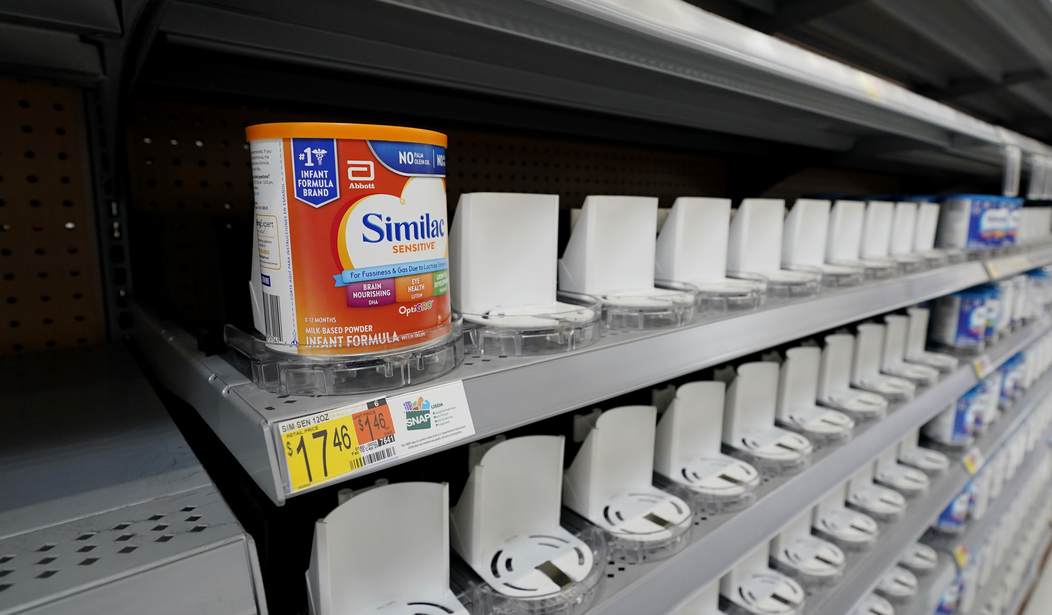The Food and Drug Administration (FDA), like all government agencies, never learns the lessons of failure. That’s why it’s very likely in the not-too-distant future for the United States to experience another shortage of baby formula.
Last month, the FDA sent warning letters to four infant formula manufacturers warning them that their practices in handling contamination of their products were deficient.
“You did not establish a system of process controls covering all stages of processing that was designed to ensure that infant formula does not become adulterated due to the presence of microorganisms in the formula or in the processing environment,” the FDA wrote in its letters to ByHeart Inc., Reckitt/Mead Johnson Nutrition, and Perrigo Wisconsin.
This is a shortage waiting to happen. And the sad fact is that the United States has yet to fully recover from the last shortage of infant formula. There are still spot shortages of some kinds of formula, either due to supply chain problems that still bedevil the industry or shortsighted regulators that still impose a 27% tariff on imports of formula.
During the 2022 shortage, Congress temporarily lifted the tariffs on infant formula imports. That eased the immediate problem. But by the beginning of 2023, the tariffs were reimposed leading to artificial shortages.
“Any time you add a tax of approximately 25 percent, some of that’s gonna get passed onto consumers, and domestic prices will adjust upward to match the import prices,” Scott Lincicome, director of the Herbert A. Stiefel Center for Trade Policy Studies at the Cato Institute, told Reason last December. “And the second thing is, any time you add a tax of that level, you’re gonna get less supply. Consumers and importers, retailers in the rest of the United States will try to avoid importing more formula if they can because there’s gonna be less demand for it, cause it’s gonna be expensive.”
Last July, during the depths of the shortage, Congress passed a bill that temporarily waived formula tariffs. While this measure directly helped to ease the supply crunch, the tariffs returned at the end of the year—which unsurprisingly led formula imports to decrease and out-of-stock rates to rise.
On the bright side, the FDA also announced in July 2022 that it would permanently ease draconian regulations that made it nearly impossible for foreign formulas to gain approval to be sold in the United States. However, high tariffs have still kept formula imports low.
In June, a bipartisan group of lawmakers introduced the Formula 3.0 Act, which would permanently remove high tariffs on baby formula imports.
“A combination of ‘absurdly high’ federal tariffs and excessive FDA regulations created the conditions for a crisis,” writes Eric Boem in Reason.
If I were a parent, would I really care about “excessive” FDA regulations that keep contaminated formula off supermarket shelves? That might be one area of government oversight I’m thankful for. The high tariffs, however, need to go. And Congress is working on that problem in a bipartisan manner.
The root of the difficulty is the anticompetitive, anti-capitalist policies of the government pressured by a few multinational companies to keep foreign infant formula out. They’re aided by the powerful dairy lobby which likes the way things in the infant formula industry are just fine.
But Congress is looking to change that with the Formula 3.0 Act. Reps. Adrian Smith (R-Neb.) and Don Beyer (D-Va.) introduced the bill in the House. Sens. Mike Lee (R-Utah) and Bob Menendez (D-N.J.) introduced companion bills in the U.S. Senate.
“The baby formula crisis put an additional spotlight on the serious supply chain challenges we face,” Smith, Chairman of the Ways and Means Trade Subcommittee, said. “Congress immediately came together in a bipartisan way to waive tariffs on safe, FDA-approved formula, and it alleviated some of the pressures families faced when searching for formula. Now that those tariffs have returned, the availability of formula has become strained once again. That’s why we are working in a bipartisan, bicameral way to permanently lift barriers to safely import formula and give families more options and access to the formula they need.”
The infant formula industry is dominated by a few very large, multi-national companies that not only artificially maintain a ruinously high price structure but leave the market wide open to serious — even catastrophic — disruptions in case of contamination. This is one instance where Congress should act in the interests of infants and mothers and pass the Formula 3.0 Act.










